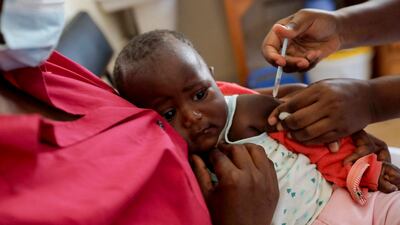The World Health Organisation reported a significant increase in the number of malaria cases globally last year, driven by extreme weather events.
In its latest report, WHO said there were about 249 million malaria cases globally last year compared to 244 million in 2021. The figure exceeds the pre-Covid pandemic level of 233 million in 2019 by 16 million cases.
Last year, 94 per cent of all malaria cases (233 million) were in the WHO African Region. The five million additional cases were mainly found in Pakistan, Ethiopia, Nigeria, Uganda and Papua New Guinea.
The WHO is urging more action to tackle climate change as floods and temperature increases are creating a perfect storm for mosquitoes, resulting in rising malaria cases.
The 2023 World Malaria Report examined the nexus between climate change and malaria and revealed that changes in temperature, humidity and rainfall influenced the behaviour and survival of the malaria-carrying Anopheles mosquito.
The report warned extreme weather events, such as heatwaves and flooding, can directly affect transmission of the disease and revealed that the catastrophic flooding in Pakistan in 2022 led to a five-fold increase in malaria cases in the country to 2.6 million cases in 2022 from 500 000 in 2021.
“The changing climate poses a substantial risk to progress against malaria, particularly in vulnerable regions,” Dr Tedros Adhanom Ghebreyesus, WHO director general, said.
“Sustainable and resilient malaria responses are needed now more than ever, coupled with urgent actions to slow the pace of global warming and reduce its effects.”
The WHO warned climate variability is expected to have indirect effects on malaria trends through reduced access to essential malaria services and disruptions to the supply chain of insecticide-treated nets, medicines and vaccines.
The WHO said population displacement due to climate-induced factors may also lead to increased malaria as those without immunity migrate to endemic areas.
Deaths from malaria fell to 608,000 last year compared to 610,000 in 2021, however, the figures still exceed pre-pandemic deaths which saw 576,000 recorded in 2019.
In 2022, 95 per cent of all malaria deaths (580,000) were in the WHO African Region.
It said its effort to reduce mortality rates by 2025 is off track by 55 per cent and if trends continue its 2030 target will be missed by 89 per cent.
In 2022, the global malaria mortality rate was 14.3 against a target of 6.6 deaths per 100 000 people at risk. The WHO warned that “without an acceleration in the pace of progress the 2030 outlook indicates a potential 89 per cent shortfall”.
“It is crucial to recognise the multitude of threats that impede our response efforts,” Dr Matshidiso Moeti, WHO Regional Director for Africa, said.
“Climate variability poses a substantial risk, but we must also contend with challenges such as limited healthcare access, continuing conflicts and emergencies, the lingering effects of Covid-19 on service delivery, inadequate funding and uneven implementation of our core malaria interventions.
“To forge ahead towards a malaria-free future, we need a concerted effort to tackle these diverse threats that fosters innovation, resource mobilisation and collaborative strategies.”
The WHO said the Anopheles stephensi mosquito has been detected in Africa, beyond its native Asian and Arabian habitats, and warned it is challenging to control as it thrives in urban settings, endures high temperatures and is resistant to many insecticides.
Between 2010 and 2020, the WHO has recorded 78 countries confirming they have witnesses mosquito resistance to at least one insecticide class, and 29 countries noted resistance to all four insecticide classes.
Dr Michael Adekunle Charles, CEO of the RBM Partnership to End Malaria, said investment is needed.
“We are at a crossroads because we are seeing more cases happening on the ground,” he said.
“We need to invest drastically, there are shortfalls in the fight against Malaria.
“If we come together we can make a difference, we need to see cases go down. Lets work together and make sure countries are in the driving seat and avert more deaths.”
WHO says more funding is needed as available finance is “off target by a wide margin”.
In 2022, a total of $4.1 billion was invested globally in the malaria response against a target of $7.8 billion, it said.
“Strengthened political will is needed to translate commitments into tangible resources and actions that will save more lives,” it said.
“The added threat of climate change calls for sustainable and resilient malaria responses that align with efforts to reduce the effects of climate change. Whole-of-society engagement is crucial to build integrated approaches.”
It is calling for urgent action on climate change and health through effective collaboration and says more resilient health systems need to be created.


